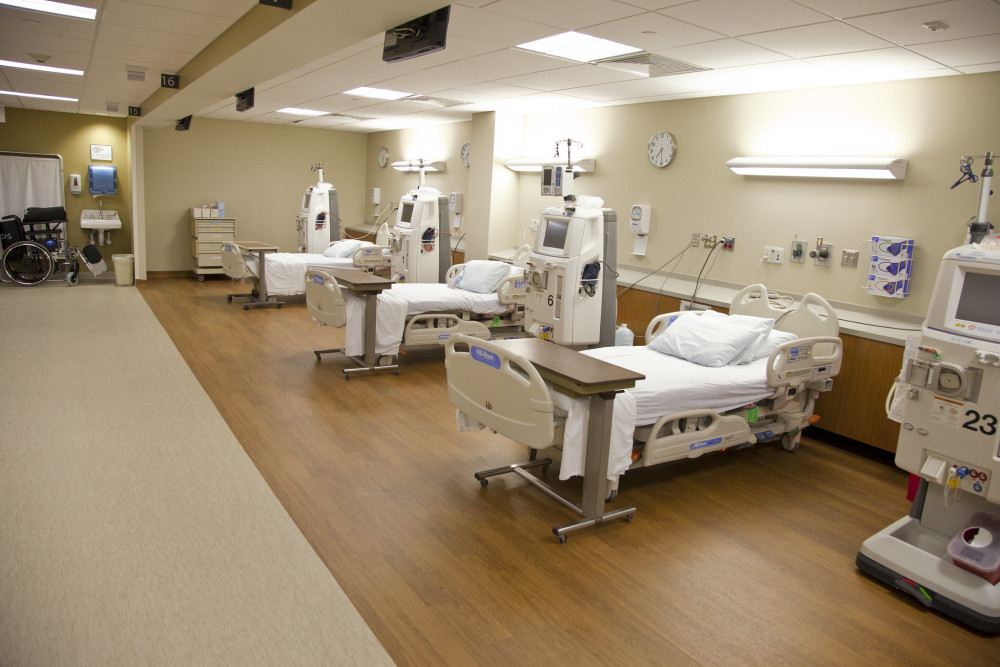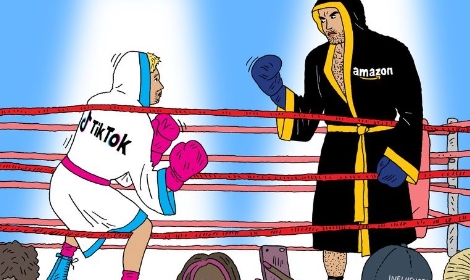是什么让美国的医疗体系如此昂贵?(一)
正文翻译

What makes the US healthcare system so expensive?
是什么让美国的医疗体系如此昂贵?

What makes the US healthcare system so expensive?
是什么让美国的医疗体系如此昂贵?
评论翻译
Jacob VanWagoner
Why are healthcare costs in the United States so incredibly expensive?
There are a number of identifiable causes, and I will cite examples where possible.
1) Constriction of supply.
Health care is one of those interesting problems in economics where it's essential enough that a significant number of people will go for anything that might help at any cost. While in a normal market, "anything that might help at any cost" doesn't lead to massive price ramps because high margins with high volumes draw in competitors who undercut each other, in health care it doesn't because supply is constricted in various ways. (Thanks Jim Kenyon for mentioning the oddities of the health care market).
为什么美国的医疗费用如此昂贵?
有许多可识别的原因,我尽可能列举一些例子。
1、供给紧缩
医疗保健是经济学中有趣的问题之一,它是足够重要的,以至于很多人会不惜任何代价去做对其可能有所帮助的事情。而在一个正常的市场中,“不惜任何代价去做对其可能有所帮助的事情”都不会导致价格大幅上涨,因为高利润和高销量吸引了竞争对手相互削价,但在医疗保健领域,情况并非如此,因为供方受到了各种方式的限制。(感谢吉姆·凯尼恩提到医疗保健市场的古怪之处)。
a) Regional monopolies (mentioned by Shane Bogusz)
Regional monopolies are, for the most part, dictated by law. Certificate of need laws are explicit in 35 states, and the remaining 15 states are required to meet a national certificate of need-like requirement.
Certificate of Need laws are a requirement that any new medical facility must first obtain a certificate from the state health agency (pretty much staffed by the hospital administrators) before the facility can be constructed.
An equivalent in other markets might be this:
You have a new microprocessor design that, according to simulations, give much better power efficiency with very good performance per clock cycle, and you have the design and everything ready to go. But before you are allowed to sell this microprocessor, you must first get permission from Intel, and they must verify that they are unable to reach the entire desired market with their products before they will allow you to sell it.
In other words, keep competitors out so you can keep prices high.
In Utah, the Certificate of Need requirement is not in effect, and its costs per person are among the lowest and its outcomes are among the best. In most states or regions, there is a single hospital network -- many facilities, but all owned by the same group, but in Utah there are many. The University of Utah health network operates entirely independently from the Intermountain Health Care network, which operates independently from the Mountain Star Network -- and that's just in the Salt Lake City metro area.
a) 区域垄断(Shane Bogusz提到)
区域垄断在很大程度上是由法律决定的。35个州制定了明确了法律规定所需证件,其余15个州必须提供类似的所需证件。
法律规定所需证件,任何新的医疗设施在建设之前都必须首先从国家卫生机构(几乎由医院管理人员组成)获得证件。
其他市场的类似情况可能是:
你有了一个新的微处理器设计,根据模拟,每个时钟周期的性能都很好,功率效率更高,你的设计和一切都准备好了。但在你被允许销售这款微处理器之前,你必须首先获得英特尔的许可,他们也必须在允许你销售产品之前,核实他们的产品无法触达整个市场。
换句话说,把竞争对手挡在门外,这样你就可以让你的产品保持高价格。
在犹他州,所需证件方面的法律没有生效,人均成本最低,结果最好。在大多数州或地区,都有一个单一的医院网络——众多设施都归同一集团所有,但在犹他州,众多设施归众多集团所有。犹他大学的医疗网络完全独立于山间医疗网络运营,山间医疗网络独立于山星网络运营,而该网络就在盐湖城都会区。
b) Educational supply restriction and barrier to entry.
Now why did this happen?
It's doctors who control the number of doctors in America, not the government.
Yes, the article is from a left wing rag, and the article is clearly slanted to portray anything resembling a free market as the worst possible thing, but the information is accurate -- the system is designed so doctors don't undercut themselves with hordes of new doctors.
There are many possible education/occupational models that can grant certification and ensure new entrants have sufficient experience, but the one we're stuck with right now is the one where doctors get to control how many new guys enter their field.
Furthermore, the cost of education is ridiculous, putting up a huge barrier to entry, essentially making it required that doctors are paid extremely well in order to justify the high price of the education.
Credit: KevinMD - Medical education cost is a health policy imperative
I would almost call that enslavement. At that cost, there's no way you could afford to be doling out low-price care to those who need it without having another way to make money. There's no way you could choose any other profession except perhaps high-paid salesman/consultant. On a 30 year term with a 4% interest rate, that's somewhere around $800/mo (didn't do actual calculation, just estimates). It's comparable to owning a second house, but without the benefit of being able to sell it or live in it.
In any case, the high cost of education is yet another way the medical industry constricts supply.
And it really shows. Just Google "doctor shortage" and you'll get a ton of hits lixing to studies, etc.
b) 教育供给限制和入学障碍。
为什么会发生这种情况?
控制美国医生数量的是医生,而不是政府。
是的,这篇文章来自左翼,而且这篇文章显然倾向于将任何类似自由市场的事情描绘成最糟糕的事情,但信息是准确的——这个系统的设计是为了不会出现大批新医生,从而让医生自己变得廉价。
有很多可能的教育/职业模式可以授予认证,并确保新进入者有足够的经验,但我们现在遇到的问题是,医生可以控制进入医生领域的新人数量。
此外,教育成本高得离谱,这为医生的进入设置了巨大的障碍,基本上要求医生获得极高的报酬,以证明高昂的教育成本是合理的。
来源:KevinMD-医学方面的教育成本是医疗政策的当务之急
我几乎会称之为奴役。在这样的成本下,你不可能在没有其他赚钱途径的情况下,向那些有需要的人提供低价医疗服务。除了高薪的推销员/顾问,你不可能选择任何其他职业。在利率为4%的30年期贷款中,大约是每月800美元(没有实际计算,只是估计)。这相当于拥有第二套房子——但不能出售它、不能居住。
总之,高昂的教育成本是医疗行业限制供应的另一种方式。
这真的很明显。只要在谷歌上搜索“医生短缺”,你就会获得研究这方面的大量链接。
2) Price opacity.
a) hiding the price.
Good luck finding the price of a procedure, no matter how routine or obscure, voluntary or involuntary it is.
Peeling Away Health Care's Sticker Shock
The Pricing Of U.S. Hospital Services: Chaos Behind A Veil Of Secrecy
2、价格不透明。
a) 隐藏价格。
祝你好运,找到一个程序的价格,无论多么常规或模糊的,自愿或非自愿的。
剥去医疗服务的价格冲击
美国医院服务定价:秘密面纱背后的混乱
b) Insurance games.
Classically, insurance is supposed to be about protecting your assets -- that is, paying for replacement in the case of something lost, stolen or broken, paying for property damage that you caused by your accident in a car, or other such things. In no other industry is it "pay for everything," but rather a "pay for everything that you can't afford" system.
In other industries, insurance pays the total value of damages. In cases where there is a lawsuit, insurance will settle out of court for less than the amount of the lawsuit to avoid the risk of losing money.
In health care, it is not so. For many people, insurance pays for everything, minus copays. The person receiving the service is disconnected from payment and therefore has little to no power to negotiate. Combined with the restriction of supply, the consumer really doesn't have much power at all. Furthermore, the explanation of benefits and/or bills for service are almost completely BS.
b) 保险游戏。
传统上,保险应该是为了保护你的资产——也就是说,在东西丢失、被盗或损坏的情况下支付补偿费,支付因车祸或其他类似事件造成的财产损失。在其他行业中,没有一个是“为一切买单”,而是“为你负担不起的一切买单”。
在其他行业,保险支付损失的全部价值。在发生诉讼的情况下,保险公司将以低于诉讼金额的金额庭外和解,以避免损失金钱的风险。
在医疗保险领域,情况并非如此。对许多人来说,保险支付自付额之外的一切费用。接受医疗服务的人不参与付款,因此几乎没有谈判的权力。再加上供应的限制,消费者真的没有太多的权利。此外,对福利和/或服务账单的解释几乎完全是胡扯。
Dr. David Belk at True Cost of Health Care explains this quite well:
Why do these tests cost them so much more than an insurance company would usually pay? Insurance companies don’t negotiate—at least not with groups as small as the lab at this hospital. They set a reimbursement rate, which is usually pretty close to what Medicare pays, and we (or the hospital) smiles and says “thank you.” After all, if we’re doing it for Medicare for $75, we’ll probably do it for United Health Care (or any other insurance company) for $80. Why would anyone say “no”?
I can think of at least two reasons an insurance company might price services so outrageously high on certain policies. First, that would punish anyone who buys inexpensive insurance with a high deductible. Second, they keep you from finding out how much (little) medical service really cost. Patients with high deductibles pay for most of their own medical care. The insurance companies make sure that these patients see a much higher price than the “real” price that they could pay. Just as with generic prescxtion drugs, insurance companies, not providers determine the price of everything. They can hide their real costs, and punish you for not buying a more expensive plan.
大卫·贝尔克(David Belk )博士很好地解释了“医疗保险的真实成本”:
为什么这些检测的费用比保险公司通常支付的费用要高得多?保险公司不会进行谈判——至少不会与像医院的实验室这样小的团体进行谈判。他们设定了一个报销率,通常与医疗保险支付的费用非常接近,我们(或医院)微笑着说“谢谢”。毕竟,如果我们完成某些任务,医疗保险报销75美元,我们完成某些任务可能要求联合医疗保险公司(或者其它保险公司)支付80美元,对此为什么说“不”?
我至少能想到两个原因,某家保险公司可能会在某些保单上对服务定价过高。首先,这将严重伤害到购买了高免赔额的廉价保险的人。其次,他们让你无法了解医疗服务的实际成本。购买高免赔额保险的患者自己要支付大部分医疗费用。保险公司确保这些病人看到的价格远远高于他们可以支付的“真实”价格。就像非专利处方药一样,决定所有药品价格的不是供应商,而是保险公司。他们可以隐藏他们的实际成本,并让没有购买更昂贵的保险计划的你深受伤害。
If an occasional patient has a policy that pays at or near the maximum price charged by the hospital, the hospital is motivated to keep their outrageously high prices. This helps to keep medical care unaffordable to private payers. If these inflated reimbursement rates are only on policies that have very high deductibles, the insurance company will rarely get stuck with the bill. Even at these outrageous prices, most people with private insurance will never need more than $1,500 of medical care in a year. On occasion, someone with one of these policies will have a serious illness and the insurance will have to pay big, but the insurance companies more than make up for these loses with the increase in premiums they get by maintaining their smokescreen.
(What isn't mentioned: there are a few states where if you are on a high deductible plan, then the rate that you pay is equal to the insurance "negotiated" rate -- that is, you pay the same as the insurance company would pay even if you haven't met your deductible. I know of only 2 states that do that -- Utah and Arizona -- and there may be more, but most states do not regulate insurance in that way).
如果一个病人偶然的拥有这样一份保单,支付的费用等于或接近医院收取的最高价格,那么医院就有动力保持他们那高得离谱的价格。这倾向于让私人支付者负担不起医疗费用。如果这些夸大的报销比例只适用于免赔额非常高的保单,保险公司就很少会被账单卡住。即使在如此离谱的价格下,大多数拥有私人保险的人一年的医疗费用也不会超过1500美元。有时,投保这些保单的人也会患上严重疾病,保险公司将不得不为此支付大笔费用,但保险公司通过维持障眼法来增加保费,弥补了这些损失。
(没有提到的是:在一些州,如果你参加了高免赔额保险计划,那么你支付的报销比例等于“协商”的保险报销比例——也就是说,即使你的医疗费用还没有达到免赔额,保险公司也会和你平分费用。据我所知,只有两个州这样做——犹他州和亚利桑那州——可能还有更多州如此操作,但大多数州并不以这种方式监管保险业)。
c) the drive for cost/profit
Some folks blame the fee-for-service model of payment, which makes sense. After all, if you get paid per procedure, you'll do what you can to make sure you jam in more procedures. But if the consumer has any degree of power, they'll try to minimize their costs or do whatever is in their best interests. If you post a sign in an ER that says "ER visit: $300; Office visit: $75" I'm sure you'd see a lot more people skipping the ER unless it's a genuine emergency. If you indicate that an MRI costs $500 versus $100 for an x-ray that is just as likely to give the same information, people will pick the x-ray.
The problem is when fee for service is combined with cost obfuscation and supply restriction -- making it so the cheaper alternatives aren't considered as options, either because they're constrained to be unavailable or just because the patient is unaware that the alternative is cheaper.
There is another model used in a number of places in the US -- doctors on salary and people on "unlimited services for fixed monthly fee" plans. This encourages the doctor to try to go for lower cost alternatives, and the patient then is the one to push for more.
As long as the costs aren't obfuscated, both models seem to work pretty well.
c) 追求成本/利润比
一些人指责这种按服务收费的支付模式,这是有道理的。毕竟,如果你每做一次手术就能得到报酬,你就会尽你所能去确保你能做更多的手术。但如果消费者有一定程度的权力,他们会尽量减少成本或做任何符合他们最大利益的事情。如果你在急诊室贴上一块牌子,上面写着“急诊就诊:300美元;诊所就诊:75美元”,我肯定你会看到更多的人不会去看急诊了,除非是真的遇到紧急情况。如果你指出核磁共振成像要花费500美元而照X光要花费100美元,人们会选择照X光的,而且照X光提供的信息可能是一样的。
问题是,当服务收费与成本混淆和供应限制结合在一起时——使得更便宜的替代方案不被视为选择,要么是因为它们被限制为不可用,要么只是因为患者不知道替代方案更便宜。
在美国的许多地方,还有另一种模式——医生拿薪水、患者享受此计划“每月固定费用,无限服务”。这鼓励医生尝试低成本的替代方案,然后病人就会去争取更多。
只要成本不被混淆,这两种模式似乎都能有效运作。
3) Push for more care than is necessary.
a) Good old Racketeering
I've got a few stories of tests ordered when not necessary. 95% probability it's IBS? Well, let's take a CT scan just to make sure it's not something else. By the time you get the scan, you could have been getting treated for IBS and would have started to feel better, confirming the diagnosis. But no, get the scan just to be safe, right?
A significant portion of this is blamed on defensive medicine -- stuff done just to cover bases and make sure the doctor doesn't get sued.
3、尽量多加小心。
a)合情理且古老的诈骗
我有一些关于在不必要的时候安排检测的故事。95%的概率是肠易激综合征;好吧,让我们做一个CT扫描,以确保它不是其他问题。当你进行扫描时,你可能已经接受了肠易激综合征的治疗,并且会开始感觉更好,从而确认诊断。但本不该这样的,完全是为了放心才进行的CT扫描,对吧?
这其中很大一部分要归咎于防御性医疗——做这些事情只是为了打掩护,确保医生不会被起诉。
Furthermore, it's not just a matter of getting effective treatment, it's that they pick which treatment based on pharmaceutical salespeople's arguments, and based on their bottom line rather than what's good for you and your wallet. Many will push MRI and CT when a simple x-ray is enough (such as for injuries). Push for the latest expensive drug when there's a cheap-o generic one that does the trick just as well. Or, you know, get people to pony up for things that statistically don't help, like this:
Statistically the treatment isn't doing anything to reduce death rates. Chances are you'll die of something else before you die of prostate cancer, even if you're diagnosed with it. Oh, and if you get treated, say goodbye to your days without diapers.
Medical disclaimer: Not being a physician, I can not tell you in your case whether or not prostate cancer treatment is justified. All I know are the statistics that indicate a significant fraction of cases are not necessary to treat. But there are still plenty that might justify treatment, and be sure to question your doctor very thoroughly about whether or not you're going to die of prostate cancer if you are diagnosed.
此外,这不仅仅是获得有效治疗的问题,而是他们根据药品销售人员的论点,根据他们的底线,而不是什么对你和你的钱包有好处,来选择哪种治疗方法。当一个简单的x光片就足够了(比如受伤)时,许多人会推动磁共振成像(MRI)和CT。当有一种便宜的非专利药物也能起到同样的作用时,就去推荐购买最新的昂贵药物。或者,你知道的,让人们为在统计上没有什么帮助的事情去买单,比如这样:
从统计数据来看,这种治疗对降低死亡率没有任何作用。即使你被诊断出患有前列腺癌症,你也有可能在死于前列腺癌之前死于其他疾病。哦,如果你得到了治疗,就跟不用尿布的日子说再见吧。
医学免责声明:作为一名医生,我不能告诉你在你的情况下前列腺癌治疗是否合理。我所知道的只是统计数据表明,相当一部分病例不需要治疗。但仍然有很多治疗方法是合理的,一定要非常彻底地询问你的医生,你是否被诊断出会死于前列腺癌症。
b) People are deathly afraid of death, no matter how inevitable. They'd gladly take a year of suffering and dependence over two months of pain with independence. The problem here is, I believe, that the statistics are obfuscated. End of life treatments are considered as something to cure whatever comes up, rather than as something that merely delays the inevitable.
Altogether the system doesn't favor people taking better care of themselves when they're younger. With proper education on it and a sense of responsibility for the outcomes (instead of 'oh, someone else will end up paying for it') people might be more inclined to take better care of themselves so they don't need tubes hanging out of them to keep them going for another minute as they ferry themselves around on motorized chairs. In a system where that isn't an option and everyone's aware of it, they tend to take care of themselves better. Or as Rick Santelli put it in reference to the financial system, "Failure is the most effective regulation."
b)人们非常害怕死亡,无论死亡是多么不可避免。他们宁愿忍受一年的痛苦和依赖,也不愿忍受两个月的痛苦但独立的生活状态。我认为,统计数据是模糊的。临终治疗被认为是治愈一切的方法,而不是仅仅拖延不可避免的事情。
总的来说,这个体系并不支持人们在年轻时更好地照顾自己。有了适当的教育和对结果的责任感(而不是“哦,其他人最终会为它买单”),人们可能会更倾向于更好地照顾自己,当他们坐在电动椅子上四处走动时,他们不需要让管子插在他们身上来让自己再活一分钟。在一个没有选择的系统中,每个人都意识到这一点,他们往往会更好地照顾自己。或者,正如里克·桑泰利(Rick Santelli)在谈到金融体系时所说,“失败是最有效的监管。”
Why are healthcare costs in the United States so incredibly expensive?
There are a number of identifiable causes, and I will cite examples where possible.
1) Constriction of supply.
Health care is one of those interesting problems in economics where it's essential enough that a significant number of people will go for anything that might help at any cost. While in a normal market, "anything that might help at any cost" doesn't lead to massive price ramps because high margins with high volumes draw in competitors who undercut each other, in health care it doesn't because supply is constricted in various ways. (Thanks Jim Kenyon for mentioning the oddities of the health care market).
为什么美国的医疗费用如此昂贵?
有许多可识别的原因,我尽可能列举一些例子。
1、供给紧缩
医疗保健是经济学中有趣的问题之一,它是足够重要的,以至于很多人会不惜任何代价去做对其可能有所帮助的事情。而在一个正常的市场中,“不惜任何代价去做对其可能有所帮助的事情”都不会导致价格大幅上涨,因为高利润和高销量吸引了竞争对手相互削价,但在医疗保健领域,情况并非如此,因为供方受到了各种方式的限制。(感谢吉姆·凯尼恩提到医疗保健市场的古怪之处)。
a) Regional monopolies (mentioned by Shane Bogusz)
Regional monopolies are, for the most part, dictated by law. Certificate of need laws are explicit in 35 states, and the remaining 15 states are required to meet a national certificate of need-like requirement.
Certificate of Need laws are a requirement that any new medical facility must first obtain a certificate from the state health agency (pretty much staffed by the hospital administrators) before the facility can be constructed.
An equivalent in other markets might be this:
You have a new microprocessor design that, according to simulations, give much better power efficiency with very good performance per clock cycle, and you have the design and everything ready to go. But before you are allowed to sell this microprocessor, you must first get permission from Intel, and they must verify that they are unable to reach the entire desired market with their products before they will allow you to sell it.
In other words, keep competitors out so you can keep prices high.
In Utah, the Certificate of Need requirement is not in effect, and its costs per person are among the lowest and its outcomes are among the best. In most states or regions, there is a single hospital network -- many facilities, but all owned by the same group, but in Utah there are many. The University of Utah health network operates entirely independently from the Intermountain Health Care network, which operates independently from the Mountain Star Network -- and that's just in the Salt Lake City metro area.
a) 区域垄断(Shane Bogusz提到)
区域垄断在很大程度上是由法律决定的。35个州制定了明确了法律规定所需证件,其余15个州必须提供类似的所需证件。
法律规定所需证件,任何新的医疗设施在建设之前都必须首先从国家卫生机构(几乎由医院管理人员组成)获得证件。
其他市场的类似情况可能是:
你有了一个新的微处理器设计,根据模拟,每个时钟周期的性能都很好,功率效率更高,你的设计和一切都准备好了。但在你被允许销售这款微处理器之前,你必须首先获得英特尔的许可,他们也必须在允许你销售产品之前,核实他们的产品无法触达整个市场。
换句话说,把竞争对手挡在门外,这样你就可以让你的产品保持高价格。
在犹他州,所需证件方面的法律没有生效,人均成本最低,结果最好。在大多数州或地区,都有一个单一的医院网络——众多设施都归同一集团所有,但在犹他州,众多设施归众多集团所有。犹他大学的医疗网络完全独立于山间医疗网络运营,山间医疗网络独立于山星网络运营,而该网络就在盐湖城都会区。
b) Educational supply restriction and barrier to entry.
Now why did this happen?
It's doctors who control the number of doctors in America, not the government.
Yes, the article is from a left wing rag, and the article is clearly slanted to portray anything resembling a free market as the worst possible thing, but the information is accurate -- the system is designed so doctors don't undercut themselves with hordes of new doctors.
There are many possible education/occupational models that can grant certification and ensure new entrants have sufficient experience, but the one we're stuck with right now is the one where doctors get to control how many new guys enter their field.
Furthermore, the cost of education is ridiculous, putting up a huge barrier to entry, essentially making it required that doctors are paid extremely well in order to justify the high price of the education.
Credit: KevinMD - Medical education cost is a health policy imperative
I would almost call that enslavement. At that cost, there's no way you could afford to be doling out low-price care to those who need it without having another way to make money. There's no way you could choose any other profession except perhaps high-paid salesman/consultant. On a 30 year term with a 4% interest rate, that's somewhere around $800/mo (didn't do actual calculation, just estimates). It's comparable to owning a second house, but without the benefit of being able to sell it or live in it.
In any case, the high cost of education is yet another way the medical industry constricts supply.
And it really shows. Just Google "doctor shortage" and you'll get a ton of hits lixing to studies, etc.
b) 教育供给限制和入学障碍。
为什么会发生这种情况?
控制美国医生数量的是医生,而不是政府。
是的,这篇文章来自左翼,而且这篇文章显然倾向于将任何类似自由市场的事情描绘成最糟糕的事情,但信息是准确的——这个系统的设计是为了不会出现大批新医生,从而让医生自己变得廉价。
有很多可能的教育/职业模式可以授予认证,并确保新进入者有足够的经验,但我们现在遇到的问题是,医生可以控制进入医生领域的新人数量。
此外,教育成本高得离谱,这为医生的进入设置了巨大的障碍,基本上要求医生获得极高的报酬,以证明高昂的教育成本是合理的。
来源:KevinMD-医学方面的教育成本是医疗政策的当务之急
我几乎会称之为奴役。在这样的成本下,你不可能在没有其他赚钱途径的情况下,向那些有需要的人提供低价医疗服务。除了高薪的推销员/顾问,你不可能选择任何其他职业。在利率为4%的30年期贷款中,大约是每月800美元(没有实际计算,只是估计)。这相当于拥有第二套房子——但不能出售它、不能居住。
总之,高昂的教育成本是医疗行业限制供应的另一种方式。
这真的很明显。只要在谷歌上搜索“医生短缺”,你就会获得研究这方面的大量链接。
2) Price opacity.
a) hiding the price.
Good luck finding the price of a procedure, no matter how routine or obscure, voluntary or involuntary it is.
Peeling Away Health Care's Sticker Shock
The Pricing Of U.S. Hospital Services: Chaos Behind A Veil Of Secrecy
2、价格不透明。
a) 隐藏价格。
祝你好运,找到一个程序的价格,无论多么常规或模糊的,自愿或非自愿的。
剥去医疗服务的价格冲击
美国医院服务定价:秘密面纱背后的混乱
b) Insurance games.
Classically, insurance is supposed to be about protecting your assets -- that is, paying for replacement in the case of something lost, stolen or broken, paying for property damage that you caused by your accident in a car, or other such things. In no other industry is it "pay for everything," but rather a "pay for everything that you can't afford" system.
In other industries, insurance pays the total value of damages. In cases where there is a lawsuit, insurance will settle out of court for less than the amount of the lawsuit to avoid the risk of losing money.
In health care, it is not so. For many people, insurance pays for everything, minus copays. The person receiving the service is disconnected from payment and therefore has little to no power to negotiate. Combined with the restriction of supply, the consumer really doesn't have much power at all. Furthermore, the explanation of benefits and/or bills for service are almost completely BS.
b) 保险游戏。
传统上,保险应该是为了保护你的资产——也就是说,在东西丢失、被盗或损坏的情况下支付补偿费,支付因车祸或其他类似事件造成的财产损失。在其他行业中,没有一个是“为一切买单”,而是“为你负担不起的一切买单”。
在其他行业,保险支付损失的全部价值。在发生诉讼的情况下,保险公司将以低于诉讼金额的金额庭外和解,以避免损失金钱的风险。
在医疗保险领域,情况并非如此。对许多人来说,保险支付自付额之外的一切费用。接受医疗服务的人不参与付款,因此几乎没有谈判的权力。再加上供应的限制,消费者真的没有太多的权利。此外,对福利和/或服务账单的解释几乎完全是胡扯。
Dr. David Belk at True Cost of Health Care explains this quite well:
Why do these tests cost them so much more than an insurance company would usually pay? Insurance companies don’t negotiate—at least not with groups as small as the lab at this hospital. They set a reimbursement rate, which is usually pretty close to what Medicare pays, and we (or the hospital) smiles and says “thank you.” After all, if we’re doing it for Medicare for $75, we’ll probably do it for United Health Care (or any other insurance company) for $80. Why would anyone say “no”?
I can think of at least two reasons an insurance company might price services so outrageously high on certain policies. First, that would punish anyone who buys inexpensive insurance with a high deductible. Second, they keep you from finding out how much (little) medical service really cost. Patients with high deductibles pay for most of their own medical care. The insurance companies make sure that these patients see a much higher price than the “real” price that they could pay. Just as with generic prescxtion drugs, insurance companies, not providers determine the price of everything. They can hide their real costs, and punish you for not buying a more expensive plan.
大卫·贝尔克(David Belk )博士很好地解释了“医疗保险的真实成本”:
为什么这些检测的费用比保险公司通常支付的费用要高得多?保险公司不会进行谈判——至少不会与像医院的实验室这样小的团体进行谈判。他们设定了一个报销率,通常与医疗保险支付的费用非常接近,我们(或医院)微笑着说“谢谢”。毕竟,如果我们完成某些任务,医疗保险报销75美元,我们完成某些任务可能要求联合医疗保险公司(或者其它保险公司)支付80美元,对此为什么说“不”?
我至少能想到两个原因,某家保险公司可能会在某些保单上对服务定价过高。首先,这将严重伤害到购买了高免赔额的廉价保险的人。其次,他们让你无法了解医疗服务的实际成本。购买高免赔额保险的患者自己要支付大部分医疗费用。保险公司确保这些病人看到的价格远远高于他们可以支付的“真实”价格。就像非专利处方药一样,决定所有药品价格的不是供应商,而是保险公司。他们可以隐藏他们的实际成本,并让没有购买更昂贵的保险计划的你深受伤害。
If an occasional patient has a policy that pays at or near the maximum price charged by the hospital, the hospital is motivated to keep their outrageously high prices. This helps to keep medical care unaffordable to private payers. If these inflated reimbursement rates are only on policies that have very high deductibles, the insurance company will rarely get stuck with the bill. Even at these outrageous prices, most people with private insurance will never need more than $1,500 of medical care in a year. On occasion, someone with one of these policies will have a serious illness and the insurance will have to pay big, but the insurance companies more than make up for these loses with the increase in premiums they get by maintaining their smokescreen.
(What isn't mentioned: there are a few states where if you are on a high deductible plan, then the rate that you pay is equal to the insurance "negotiated" rate -- that is, you pay the same as the insurance company would pay even if you haven't met your deductible. I know of only 2 states that do that -- Utah and Arizona -- and there may be more, but most states do not regulate insurance in that way).
如果一个病人偶然的拥有这样一份保单,支付的费用等于或接近医院收取的最高价格,那么医院就有动力保持他们那高得离谱的价格。这倾向于让私人支付者负担不起医疗费用。如果这些夸大的报销比例只适用于免赔额非常高的保单,保险公司就很少会被账单卡住。即使在如此离谱的价格下,大多数拥有私人保险的人一年的医疗费用也不会超过1500美元。有时,投保这些保单的人也会患上严重疾病,保险公司将不得不为此支付大笔费用,但保险公司通过维持障眼法来增加保费,弥补了这些损失。
(没有提到的是:在一些州,如果你参加了高免赔额保险计划,那么你支付的报销比例等于“协商”的保险报销比例——也就是说,即使你的医疗费用还没有达到免赔额,保险公司也会和你平分费用。据我所知,只有两个州这样做——犹他州和亚利桑那州——可能还有更多州如此操作,但大多数州并不以这种方式监管保险业)。
c) the drive for cost/profit
Some folks blame the fee-for-service model of payment, which makes sense. After all, if you get paid per procedure, you'll do what you can to make sure you jam in more procedures. But if the consumer has any degree of power, they'll try to minimize their costs or do whatever is in their best interests. If you post a sign in an ER that says "ER visit: $300; Office visit: $75" I'm sure you'd see a lot more people skipping the ER unless it's a genuine emergency. If you indicate that an MRI costs $500 versus $100 for an x-ray that is just as likely to give the same information, people will pick the x-ray.
The problem is when fee for service is combined with cost obfuscation and supply restriction -- making it so the cheaper alternatives aren't considered as options, either because they're constrained to be unavailable or just because the patient is unaware that the alternative is cheaper.
There is another model used in a number of places in the US -- doctors on salary and people on "unlimited services for fixed monthly fee" plans. This encourages the doctor to try to go for lower cost alternatives, and the patient then is the one to push for more.
As long as the costs aren't obfuscated, both models seem to work pretty well.
c) 追求成本/利润比
一些人指责这种按服务收费的支付模式,这是有道理的。毕竟,如果你每做一次手术就能得到报酬,你就会尽你所能去确保你能做更多的手术。但如果消费者有一定程度的权力,他们会尽量减少成本或做任何符合他们最大利益的事情。如果你在急诊室贴上一块牌子,上面写着“急诊就诊:300美元;诊所就诊:75美元”,我肯定你会看到更多的人不会去看急诊了,除非是真的遇到紧急情况。如果你指出核磁共振成像要花费500美元而照X光要花费100美元,人们会选择照X光的,而且照X光提供的信息可能是一样的。
问题是,当服务收费与成本混淆和供应限制结合在一起时——使得更便宜的替代方案不被视为选择,要么是因为它们被限制为不可用,要么只是因为患者不知道替代方案更便宜。
在美国的许多地方,还有另一种模式——医生拿薪水、患者享受此计划“每月固定费用,无限服务”。这鼓励医生尝试低成本的替代方案,然后病人就会去争取更多。
只要成本不被混淆,这两种模式似乎都能有效运作。
3) Push for more care than is necessary.
a) Good old Racketeering
I've got a few stories of tests ordered when not necessary. 95% probability it's IBS? Well, let's take a CT scan just to make sure it's not something else. By the time you get the scan, you could have been getting treated for IBS and would have started to feel better, confirming the diagnosis. But no, get the scan just to be safe, right?
A significant portion of this is blamed on defensive medicine -- stuff done just to cover bases and make sure the doctor doesn't get sued.
3、尽量多加小心。
a)合情理且古老的诈骗
我有一些关于在不必要的时候安排检测的故事。95%的概率是肠易激综合征;好吧,让我们做一个CT扫描,以确保它不是其他问题。当你进行扫描时,你可能已经接受了肠易激综合征的治疗,并且会开始感觉更好,从而确认诊断。但本不该这样的,完全是为了放心才进行的CT扫描,对吧?
这其中很大一部分要归咎于防御性医疗——做这些事情只是为了打掩护,确保医生不会被起诉。
Furthermore, it's not just a matter of getting effective treatment, it's that they pick which treatment based on pharmaceutical salespeople's arguments, and based on their bottom line rather than what's good for you and your wallet. Many will push MRI and CT when a simple x-ray is enough (such as for injuries). Push for the latest expensive drug when there's a cheap-o generic one that does the trick just as well. Or, you know, get people to pony up for things that statistically don't help, like this:
Statistically the treatment isn't doing anything to reduce death rates. Chances are you'll die of something else before you die of prostate cancer, even if you're diagnosed with it. Oh, and if you get treated, say goodbye to your days without diapers.
Medical disclaimer: Not being a physician, I can not tell you in your case whether or not prostate cancer treatment is justified. All I know are the statistics that indicate a significant fraction of cases are not necessary to treat. But there are still plenty that might justify treatment, and be sure to question your doctor very thoroughly about whether or not you're going to die of prostate cancer if you are diagnosed.
此外,这不仅仅是获得有效治疗的问题,而是他们根据药品销售人员的论点,根据他们的底线,而不是什么对你和你的钱包有好处,来选择哪种治疗方法。当一个简单的x光片就足够了(比如受伤)时,许多人会推动磁共振成像(MRI)和CT。当有一种便宜的非专利药物也能起到同样的作用时,就去推荐购买最新的昂贵药物。或者,你知道的,让人们为在统计上没有什么帮助的事情去买单,比如这样:
从统计数据来看,这种治疗对降低死亡率没有任何作用。即使你被诊断出患有前列腺癌症,你也有可能在死于前列腺癌之前死于其他疾病。哦,如果你得到了治疗,就跟不用尿布的日子说再见吧。
医学免责声明:作为一名医生,我不能告诉你在你的情况下前列腺癌治疗是否合理。我所知道的只是统计数据表明,相当一部分病例不需要治疗。但仍然有很多治疗方法是合理的,一定要非常彻底地询问你的医生,你是否被诊断出会死于前列腺癌症。
b) People are deathly afraid of death, no matter how inevitable. They'd gladly take a year of suffering and dependence over two months of pain with independence. The problem here is, I believe, that the statistics are obfuscated. End of life treatments are considered as something to cure whatever comes up, rather than as something that merely delays the inevitable.
Altogether the system doesn't favor people taking better care of themselves when they're younger. With proper education on it and a sense of responsibility for the outcomes (instead of 'oh, someone else will end up paying for it') people might be more inclined to take better care of themselves so they don't need tubes hanging out of them to keep them going for another minute as they ferry themselves around on motorized chairs. In a system where that isn't an option and everyone's aware of it, they tend to take care of themselves better. Or as Rick Santelli put it in reference to the financial system, "Failure is the most effective regulation."
b)人们非常害怕死亡,无论死亡是多么不可避免。他们宁愿忍受一年的痛苦和依赖,也不愿忍受两个月的痛苦但独立的生活状态。我认为,统计数据是模糊的。临终治疗被认为是治愈一切的方法,而不是仅仅拖延不可避免的事情。
总的来说,这个体系并不支持人们在年轻时更好地照顾自己。有了适当的教育和对结果的责任感(而不是“哦,其他人最终会为它买单”),人们可能会更倾向于更好地照顾自己,当他们坐在电动椅子上四处走动时,他们不需要让管子插在他们身上来让自己再活一分钟。在一个没有选择的系统中,每个人都意识到这一点,他们往往会更好地照顾自己。或者,正如里克·桑泰利(Rick Santelli)在谈到金融体系时所说,“失败是最有效的监管。”







